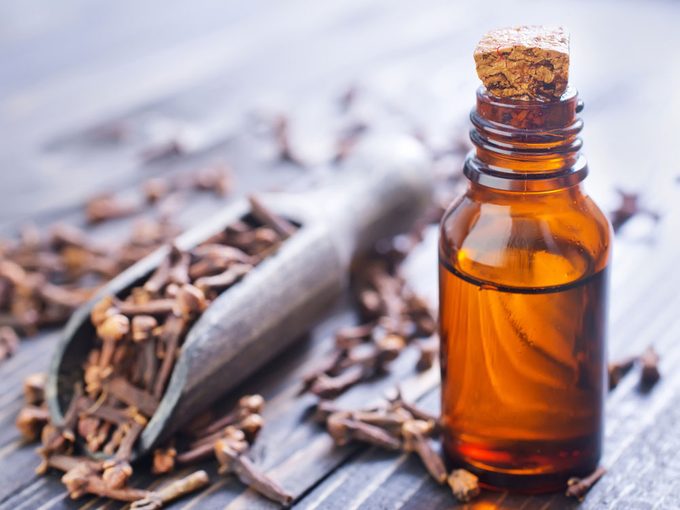Remedy Tooth Pain with All-Natural Clove Oil
Clove oil numbs and soothes the pain of toothaches, and is also used to treat respiratory and digestive ailments. It has long been suspected that clove may have anticancer effects, too

Source: The Amazing Healing Powers of Nature, Reader’s Digest
What is clove oil?
Clove oil is a common essential oil that can be purchased in most pharmacies, often in the first aid section. It is used as a local anesthetic for toothaches, as well as to help prevent stomach ulcers. Clove oil has antibacterial, anti-inflammatory and antioxidant properties, as well as possible anticancer activity.
What are commonly referred to as cloves are the dried unopened flower buds of the clove tree; the tree’s buds, stems and leaves are also used to make clove oil. The main component of clove oil, and the compound that carries clove’s characteristic aroma, is eugenol.
Clove oil for tooth pain
Pharmacies sell a range of eugenol-containing products aimed at soothing dental pain. You can also make your own toothache-easing mixture by crushing cloves in a pestle and mortar and adding a little olive oil.
These measures are designed to give only temporary relief, however, and it is important to seek professional dental care as soon as possible. Note, too, that clove oil and products containing eugenol can cause irritation in some people and that, in large amounts, clove oil is toxic when taken internally.
Medical studies and research on clove oil
Several research teams have found that eugenol is potently antibacterial and antioxidant, a fact that accounts for clove’s use as a food preservative.
Clove oil’s effectiveness as a local anesthetic has been investigated in several studies: in a 2006 study at Kuwait University, for example, clove oil worked as well as the synthetic local anesthetic benzocaine at numbing the pain of toothache.
In 2011, researchers at the University of Vale do Itaja', Brazil, found that clove enhances the production of mucus in the stomach lining, protecting against stomach ulcers. It is also an expectorant, encouraging the production of mucus in the respiratory system, and so eases coughing.
Clove oil and cancer
It has long been suspected that clove may have anticancer effects’and modern science seems to be confirming that. In 2006 researchers at the Chittaranjan National Cancer Institute in India reported that eugenol inhibits the growth of lung cancer tumours in mice, and a 2011study conducted at the IILM Institute, India, found that in the laboratory clove oil caused cancer cells to self-destruct while leaving normal blood cells unscathed. Research is ongoing.
Did you know?
‘ Clove oil has been used for centuries by Ayurvedic healers in India to treat respiratory and digestive ailments.
‘ Native to Indonesia, cloves are now also cultivated in Sri Lanka and East Africa.




